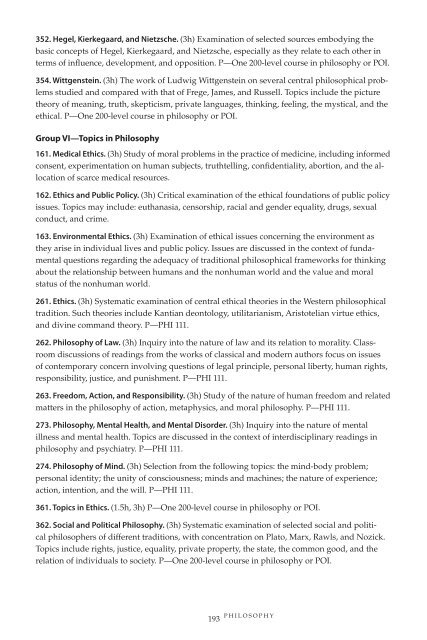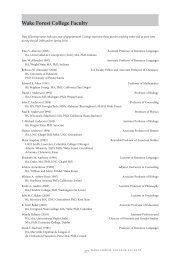theundergraduateschoo ls - Wake Forest University
theundergraduateschoo ls - Wake Forest University
theundergraduateschoo ls - Wake Forest University
Create successful ePaper yourself
Turn your PDF publications into a flip-book with our unique Google optimized e-Paper software.
352. Hegel, Kierkegaard, and Nietzsche. (3h) Examination of selected sources embodying the<br />
basic concepts of Hegel, Kierkegaard, and Nietzsche, especially as they relate to each other in<br />
terms of influence, development, and opposition. P—One 200-level course in philosophy or POI.<br />
354. Wittgenstein. (3h) The work of Ludwig Wittgenstein on several central philosophical problems<br />
studied and compared with that of Frege, James, and Russell. Topics include the picture<br />
theory of meaning, truth, skepticism, private languages, thinking, feeling, the mystical, and the<br />
ethical. P—One 200-level course in philosophy or POI.<br />
Group VI—Topics in Philosophy<br />
161. Medical Ethics. (3h) Study of moral problems in the practice of medicine, including informed<br />
consent, experimentation on human subjects, truthtelling, confidentiality, abortion, and the allocation<br />
of scarce medical resources.<br />
162. Ethics and Public Policy. (3h) Critical examination of the ethical foundations of public policy<br />
issues. Topics may include: euthanasia, censorship, racial and gender equality, drugs, sexual<br />
conduct, and crime.<br />
163. Environmental Ethics. (3h) Examination of ethical issues concerning the environment as<br />
they arise in individual lives and public policy. Issues are discussed in the context of fundamental<br />
questions regarding the adequacy of traditional philosophical frameworks for thinking<br />
about the relationship between humans and the nonhuman world and the value and moral<br />
status of the nonhuman world.<br />
261. Ethics. (3h) Systematic examination of central ethical theories in the Western philosophical<br />
tradition. Such theories include Kantian deontology, utilitarianism, Aristotelian virtue ethics,<br />
and divine command theory. P—PHI 111.<br />
262. Philosophy of Law. (3h) Inquiry into the nature of law and its relation to morality. Classroom<br />
discussions of readings from the works of classical and modern authors focus on issues<br />
of contemporary concern involving questions of legal principle, personal liberty, human rights,<br />
responsibility, justice, and punishment. P—PHI 111.<br />
263. Freedom, Action, and Responsibility. (3h) Study of the nature of human freedom and related<br />
matters in the philosophy of action, metaphysics, and moral philosophy. P—PHI 111.<br />
273. Philosophy, Mental Health, and Mental Disorder. (3h) Inquiry into the nature of mental<br />
illness and mental health. Topics are discussed in the context of interdisciplinary readings in<br />
philosophy and psychiatry. P—PHI 111.<br />
274. Philosophy of Mind. (3h) Selection from the following topics: the mind-body problem;<br />
personal identity; the unity of consciousness; minds and machines; the nature of experience;<br />
action, intention, and the will. P—PHI 111.<br />
361. Topics in Ethics. (1.5h, 3h) P—One 200-level course in philosophy or POI.<br />
362. Social and Political Philosophy. (3h) Systematic examination of selected social and political<br />
philosophers of different traditions, with concentration on Plato, Marx, Raw<strong>ls</strong>, and Nozick.<br />
Topics include rights, justice, equality, private property, the state, the common good, and the<br />
relation of individua<strong>ls</strong> to society. P—One 200-level course in philosophy or POI.<br />
P H I L O S O P H Y<br />
193






